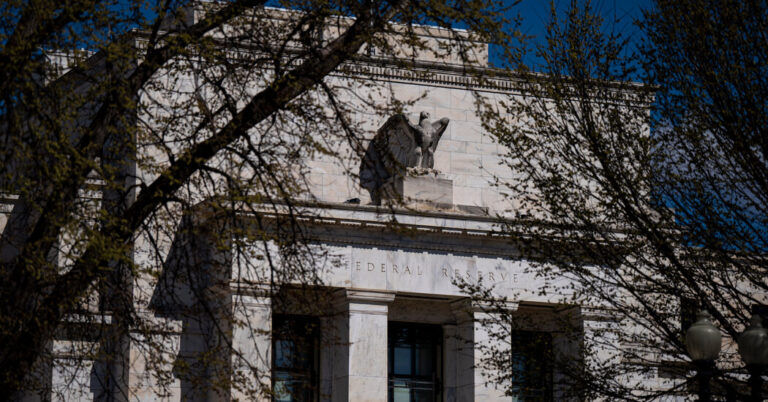A sharp rise in inflation. Fall in the value of the dollar. The collapse of their biggest customers.
America’s largest banks could survive even these dire economic scenarios, according to an analysis released Wednesday by the Federal Reserve.
The results are particularly remarkable because, in addition to the measures taken by the Fed annual banking stress testsThis year, for the first time, the industry’s top regulator subjected big lenders to an enhanced hypothetical gantlet that reflected and amplified certain news events — including the unraveling of an investment fund that ultimately contributed to the market fall. Swiss banking giant Credit Suisse.
The industry has cleared the highest bar, with as close to a clean bill of health as its leaders could have hoped.
“The banking system is capable of withstanding funding stresses under the moderate and severe economic conditions included in the exploratory analysis,” the Fed concluded.
Some 31 banks – all with more than $100 billion in assets – also passed the more routine annual stress tests, as has become common in recent years since such measures were put in place after the financial crisis of 2008. These tests measure the projected performance of banks in the event of an economic recession, high unemployment, falling real estate prices and other scenarios.
Real estate is a particular pressure point for banks, as many large lenders dumping of loans related to office buildingsamong other areas, in an era of higher interest rates and low occupancy rates for commercial space.
Even so, the Fed found that all banks held enough capital, or the money they are required to maintain to ensure stability and provide a financial cushion against losses.
The analysis is expected to be welcomed by Wall Street’s biggest banks, which have united to oppose an international effort to raise their capital requirements, which they say would limit their ability to lend and, would ultimately increase costs for consumers. The finalization of this plan, known as “Basel III final“, has been long delayed, and Fed officials have said they plan to modify it further before it is adopted.
It took just nine minutes after the results of this year’s test were released for the Financial Services Forum, a banking lobby group, to issue a statement saying the results demonstrated that rising capital requirements were not not justified, as America’s largest lenders “remain capable of supporting the economy in the face of a severe economic downturn.”
A Fed official, speaking to reporters Wednesday afternoon on condition of anonymity, said the new results do not change Basel III plans.
As banks regularly breach the bar, the usefulness of the stress tests themselves is called into question.
This week, the left-wing advocacy group Better Markets, which generally favors more regulation, derided the exams as “stress-free” and not demanding enough. Furthermore, Daniel K. Tarullo, former governor of the Federal Reserve, said last month that the regulator should consider less predictable tests.


